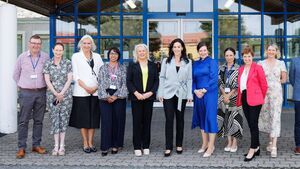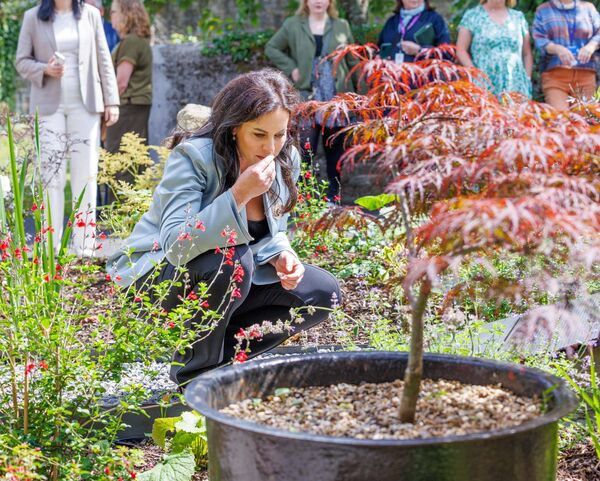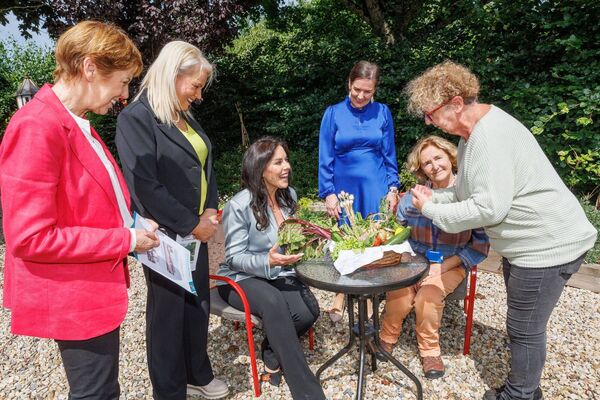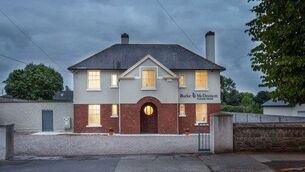Minister confirms 2026 opening for injury unit

Minister for health Jennifer Carroll MacNeill with minister of state Jennifer Murnane O'Connor and Catherine Callaghan TD and staff and HSE members during her visit to the Sacred Heart Hospital in Carlow Photos: Michael O'Rourke Photography
CARLOW’S long-anticipated minor injury unit is set to open in early 2026, minister for health Jennifer Carroll MacNeill confirmed during a visit to St Dympna’s Campus last Wednesday. Joined by Carlow TDs Jennifer Murnane O’Connor and Catherine Callaghan and HSE officials including Martina Queally, the minister outlined major health infrastructure developments and praised the county’s community-based mental health initiatives.
During a day-long visit to Carlow, minister MacNeill announced that construction of the new minor injury unit at St Dympna’s is well underway and expected to be completed by early 2026. “The minor injury unit is going to make a major difference,” she said, noting that it would improve access to urgent care while easing pressure on hospital emergency departments.

“What we’re trying to do all the time is deliver healthcare as close to home as possible and the minor injury unit is a huge support that people in Carlow need, but it also makes sure that the people of Carlow who need to be in the acute hospital have better access to the acute services that are there – to have the balance correct.”
Accompanied by HSE Dublin and Southeast regional lead (estates), Dorota Nieznanska, the minister also welcomed plans for a new ambulance base and training centre across from the St Dympna’s Campus, part of a broader strategy to expand local emergency services.
Ms Nieznanska added that it was “going to be completed early next year”, adding that “it’s going to be under the governance of the hospital, so that’s going to be a significant change for the population of Carlow”.

Mental healthcare was another key focus of the visit. At the Woodland Gardens and Activation Centre, minister MacNeill observed first-hand the community’s efforts in preventative mental healthcare. “We’re standing here today in this beautiful sensory garden,” she said, commending local programmes that combine horticulture, design and therapeutic support.
The recently-opened sensory garden, complete with an ornamental pond, potting shed, book nook, herb garden, greenhouse and more, was painstakingly landscaped and constructed by staff and service users of the HSE’s Carlow Mental Health Day Services, supported by Kilkenny-Carlow Education and Training Board (KCETB). Using mostly recycled materials and a lot of elbow grease, this formerly overgrown patch of land is now a peaceful and relaxing space for service users to sit, walk, garden and even take cookery classes.
Martina Queally, HSE regional executive officer, stressed the importance of early intervention and recovery in mental health services. “You can see the integrity around the staff work here today and the journey many people have gone on towards their recovery,” she said.
“That’s what we’re about; we’re about earlier intervention and recovery and that sense of hope,” she added.
Plans are also progressing for additional acute mental healthcare beds in the Carlow/Kilkenny region, including replacements at St Luke’s Hospital. “We’re going through the control development plan to make sure we know exactly the number required,” said Ms Nieznanska.
Deputy Catherine Callaghan and junior minister Jennifer Murnane O’Connor both underscored the value of sustained investment in Carlow.
“With more funding, we could do more here,” deputy Callaghan said, adding that “the real value of having the minister for health and HSE officials in Carlow today can’t be underestimated. They get a very clear view of what’s been done in Carlow and what can be replicated in other communities across the country”.
Minister Jennifer Murnane O’Connor pointed to Holy Angels and the CDNT as other priority projects in the pipeline, adding that it was “great to showcase all the different services and wraparound services at St Dympna’s, as well as the Carlow ETB working under health and wellbeing with the gardens, the cooking and the design work they’re doing here”.
The minister acknowledged the calls for more funding and resources and referenced ongoing developments such as the Tullow Primary Care Centre, while also addressing the challenges of an ageing population in Carlow and around the country.
“People are living longer; they’re living well, but they’re also going to have more needs as they age and that’s ahead of all of us and we need to make sure that we have provision for people in their own community,” she added, pointing to good work being done in the Sacred Heart Hospital.
In a lighter moment, the minister recalled meeting a 12-year-old golden retriever therapy dog named Rafa, part of a broader community-based mental health effort, explaining the importance of understanding how everything from a sensory garden to time spent with these therapy dogs can have a significant, positive impact on well-being. “We all have to recognise our own mental health journeys,” she said, “and be respectful of others.”
Minister MacNeill concluded by noting that while the operational budget for mental health remains the responsibility of her colleague minister Mary Butler, the capital plan includes dedicated streams for mental health facilities, including eating disorder beds and community-based supports for those in the Carlow/Kilkenny region.
Ms Nieznanska elaborated that additional acute beds as well as the replacement of existing beds at St Luke’s Hospital is also contained in the capital plan.




